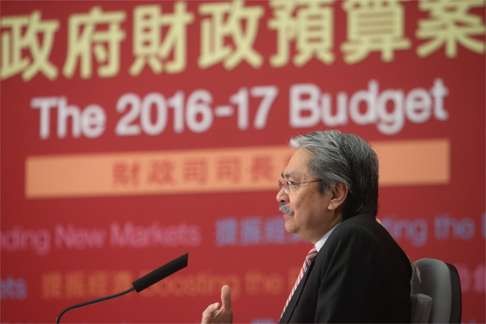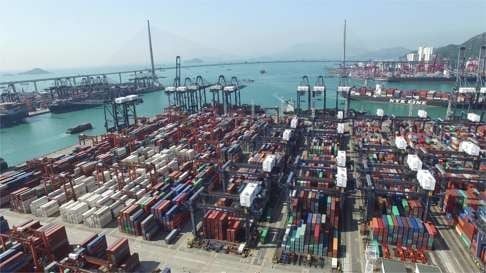
John Tsang should know that easy money doesn’t last, and Hong Kong must urgently adapt to new realities
Regina Ip says a long-term economic strategy to reorient the city’s tourism, trade, transport and logistics industries is of great importance, but you won’t find anything of the sort in the financial secretary’s budget
In 2011, Financial Secretary John Tsang Chun-wah sparked a storm of protest by proposing in his budget to inject HK$6,000 into the Mandatory Provident Fund account of every employee. His proposal met such withering attacks that he had to replace it with a cash injection of HK$6,000 into the bank account of every Hong Kong permanent resident.
Now, in his ninth year as financial secretary, Tsang has become an old hand at this game. In presenting this year’s budget, he sprinkled his narrative with “nativist” rhetoric that helped win plaudits from harsh critics of the government. Tsang’s efforts to stack up “sandbags” against future financial tsunamis – that is, saving for the future – received much less public recognition, but deserve close scrutiny.
Tsang deserves full credit for stashing away mountains of cash for future use. Hong Kong’s fiscal reserve amounts to a whopping HK$860 billion. A “future fund” of HK$220 billion has been established to provide for the rapid ageing of the population. A further HK$74 billion has been set aside as “housing reserve”, while another HK$200 billion has been put into the kitty to finance a 10-year hospital development plan. Tsang has done his level best in protecting the public coffers from possible unseemly uses.

Big business wins again in John Tsang’s budget for Hong Kong
Tsang’s performance as economic tsar tasked with the responsibility of propelling sustainable economic development, however, is much less impressive. Tsang presided over a recovery fuelled by the economic expansion of China and the arrival of large numbers of mainland Chinese tourists under the “individual visitor scheme”. In 2015, Hong Kong hosted over 59 million visitors, of which 76 per cent came from mainland China. Hong Kong’s economic leaders allowed the city to be swept along in a heady tide of easy money without forewarning the industry of the downsides of over-reliance on mainland tourism.
It came as no surprise that when tourist arrivals crashed in recent months (down 13 per cent in the first two months of this year), the government seemed clueless about the strong measures needed to relaunch Hong Kong. It can do nothing about Hong Kong’s loss of price competitiveness. It has no long-term plan for building new mega-attractions on par with Shanghai’s new Disney theme park or nearby Hengqin’s Ocean Kingdom theme park. It has no visible plan to launch high-profile international promotions to boost Hong Kong’s attractiveness. For a long time, the government and tourism authorities have been silent on the need for the local tourism and related industries to improve.

Starring role: Hong Kong’s financial chief claims credit for backing local films
Another key “pillar industry”, trade and logistics, is facing equally daunting challenges. The bad news is not just that the ranking of Hong Kong’s container port has dropped further, being overtaken by China’s Ningbo-Zhoushan. There is no need for Hong Kong to wring its hands over the loss of its global leading position, an inevitable development arising from the expansion of China’s eastern seaports. There is, however, no recognition in the budget of the wide array of adverse factors coming to bear on Hong Kong’s container industries – the much higher fees charged by local container operators, the shortage of barge berthing spaces and land for use as backup yards, and the steady relocation of manufacturing industries from the Pearl River Delta to China’s western provinces and Southeast Asia – all progressively lessening the demand for Hong Kong’s intermediary services in transport and trade.
The government’s plan to provide backup land for the logistics industry is decried as too little, too late
Although China’s Belt and Road initiative is high on the agenda of the government, there is no discussion of the long-term significance of China’s outward expansion plans for Hong Kong. The China-Pakistan economic corridor now under construction, which will create new transport routes from the Middle East to China via the port of Gwadar, as well as the India-Iran agreement to expand the strategically located Iranian seaport of Chabahar, will all result in a transformation of trade and transport patterns in our part of the world. A long-term strategy to reposition Hong Kong’s trade, transport and logistics industries in the new competitive paradigm is of the utmost urgency.
The government’s plan to provide backup land for the logistics industry in New Territories West is decried by the industry as “too little, too late”. Indeed, most of the measures announced in the budget in support of tourism, trade and logistics, such as the waiving of fees and charges for restaurants and hawkers and a “one-stop” service for trade declaration and customs clearance, are piecemeal and run-of-the-mill. They are the brainchildren of civil servants accustomed to fine-tuning government services, but not of economic leaders committed to restructuring industries.
Tsang 1, Leung 0: Finance chief’s Facebook post on Hong Kong football team ‘liked’ by thousands, while chief executive’s draws flak
With his populist tactics, Tsang has no doubt succeeded in uplifting his own image, but public relations stunts will only get you so far. The restructuring of the economy requires a much deeper root-and-branch review, a much more honest attitude in owning up to the city’s inadequacies and declining competitiveness, and a stronger commitment to reform. Sadly, such energetic commitments are missing in action.
Regina Ip Lau Suk-yee is a legislator and chair of the New People’s Party

